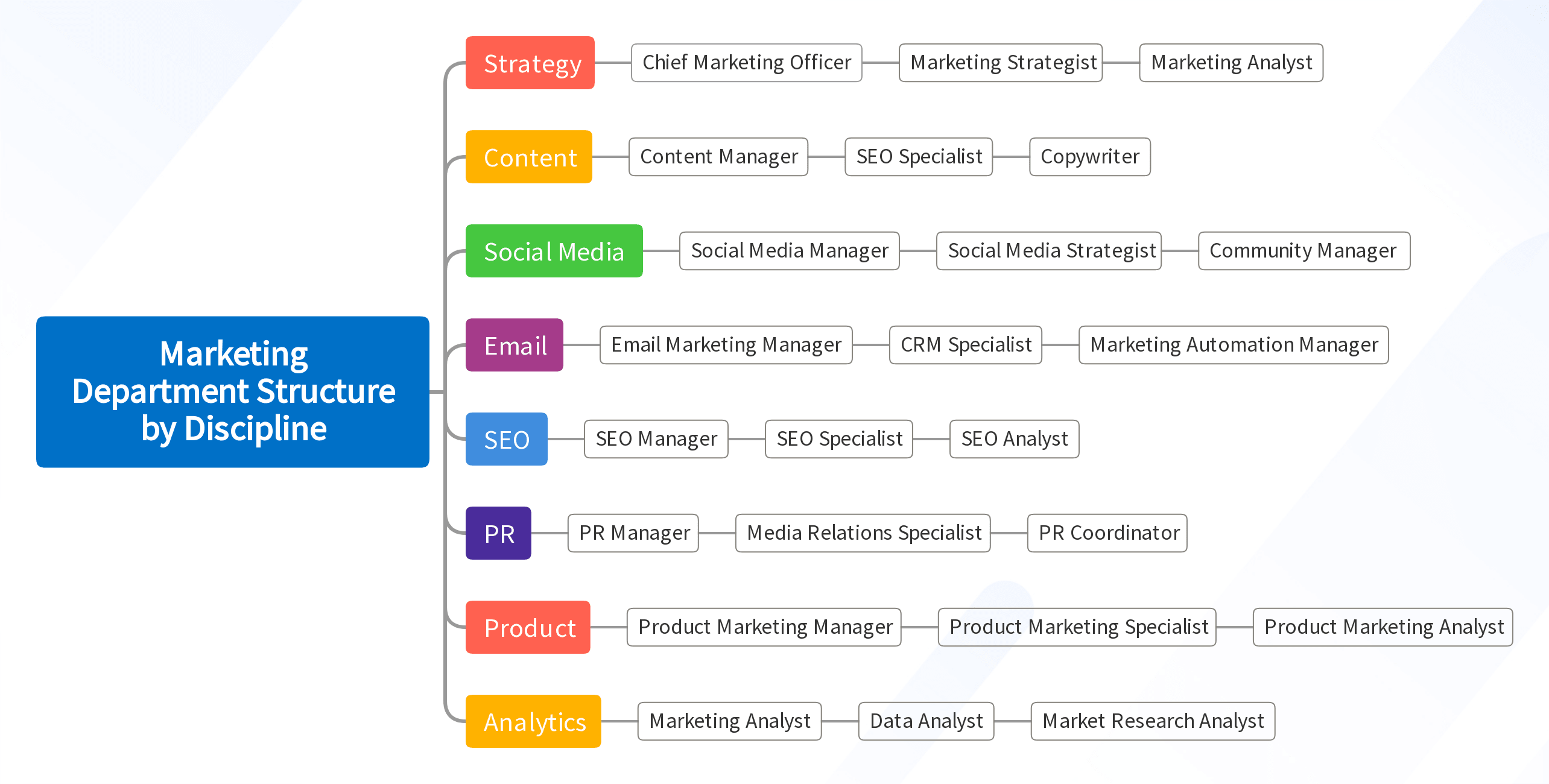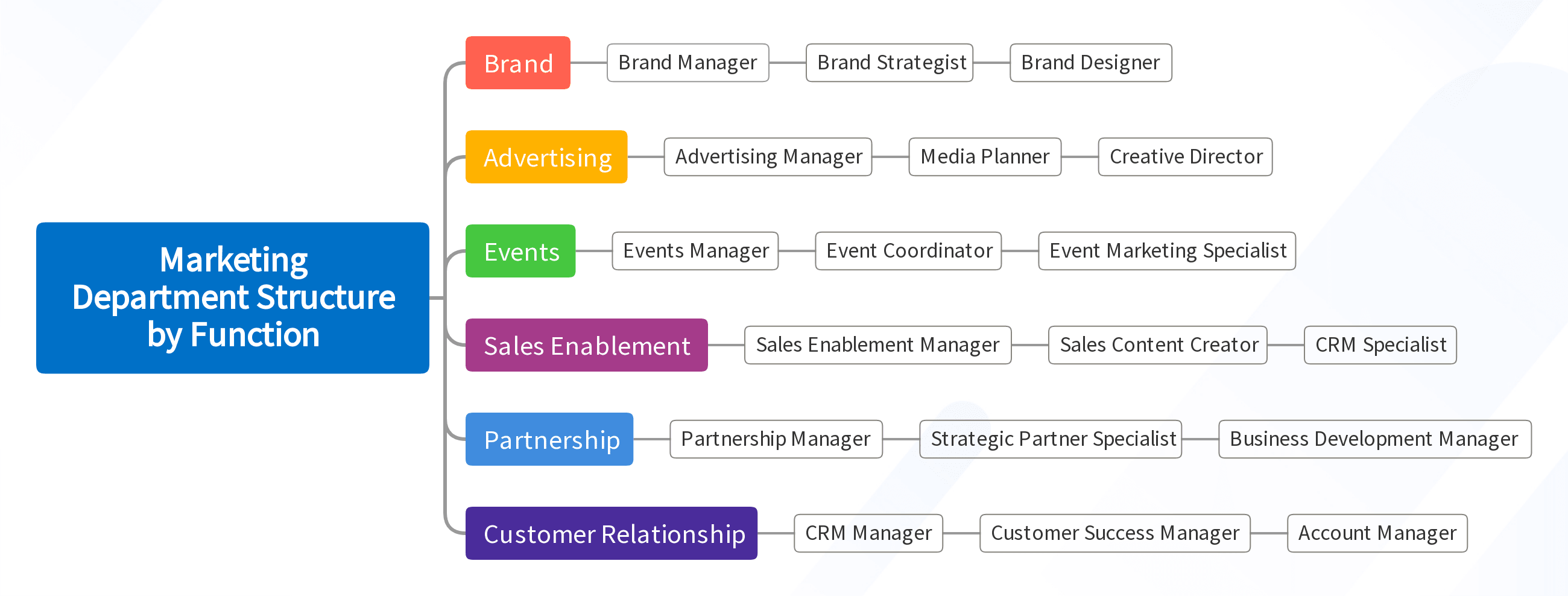

Navigating the business landscape requires strategic finesse. A well-structured marketing team serves as a compass, guiding firms through this dynamic terrain.
Understanding how to build such a team is crucial. It holds the promise of seamless operations and effective marketing strategies. We've learned this firsthand while growing our own marketing agency, GrantSpark.
But first, let's talk about the Marketing department structures you have to choose from.
Best for Growth Marketers
Best for Paid Ads & CMO's
Table of Contents
Structuring Marketing Department
There are two main types of department structures based on company size and resources.
- Marketing department structure by discipline
- Org Type: Traditional corporate departments
- Best For: Midsize/Enterprise companies
- Marketing department structure by function
- Org Type: Employees are grouped by activities and objectives
- Best For: Small to Medium Sized Business (SMB)
Let’s go in-depth to each one of them.
1. Marketing Department Structure by Discipline


Discipline-based structure involves building teams centered around various marketing disciplines. For example, SEO, Content, Market Research, and Product Strategy could each form separate teams within a department.
| Discipline | Key Skills | Potential Roles |
|---|---|---|
| Strategy | Market Research, Trend Analysis, Strategic Planning, Competitive Analysis | Chief Marketing Officer, Marketing Strategist, Marketing Analyst |
| Content | Copywriting, SEO, Content Strategy, Storytelling, Editing | Content Manager, SEO Specialist, Copywriter |
| Social Media | Community Management, Social Media Strategy, Content Creation, Analytics | Social Media Manager, Social Media Strategist, Community Manager |
| Email Strategy, CRM, Copywriting, Analytics | Email Marketing Manager, CRM Specialist, Marketing Automation Manager | |
| SEO | Keyword Research, SEO Strategy, On-page & Off-page SEO, Analytics | SEO Manager, SEO Specialist, SEO Analyst |
| PR | Media Relations, Event Coordination, Crisis Management, Brand Management | PR Manager, Media Relations Specialist, PR Coordinator |
| Product | Product Development, Market Research, Competitive Analysis, Customer Experience | Product Marketing Manager, Product Marketing Specialist, Product Marketing Analyst |
| Analytics | Data Analysis, Market Research, Trend Analysis, Reporting | Marketing Analyst, Data Analyst, Market Research Analyst |
2. Marketing Department Structure by Function


Another approach is structuring by function, where teams are formed based on the different functions they perform. For example, promotion, launches, and relationship management could all be separate teams.
| Function | Key Skills | Potential Roles |
|---|---|---|
| Brand | Brand Strategy, Visual Design, Storytelling, Market Research | Brand Manager, Brand Strategist, Brand Designer |
| Advertising | Media Planning, Creative Direction, Copywriting, Data Analysis | Advertising Manager, Media Planner, Creative Director |
| Events | Event Planning, Vendor Management, Budgeting, Public Speaking | Events Manager, Event Coordinator, Event Marketing Specialist |
| Sales Enablement | Sales Strategy, Content Creation, CRM, Presentation Skills | Sales Enablement Manager, Sales Content Creator, CRM Specialist |
| Partnership | Relationship Building, Strategic Planning, Negotiation, Communication | Partnership Manager, Strategic Partner Specialist, Business Development Manager |
| Customer Relationship | CRM, Customer Service, Communication, Problem-solving | CRM Manager, Customer Success Manager, Account Manager |
Marketing Team Size versus Business Scale
To achieve successful marketing outcomes, you need to align the team size with your business's scale – a strategic approach that helps optimize resources and drive targeted growth.
| Business Scale | Ideal Department Size | Explanation |
|---|---|---|
| Start-up | 1-3 | Limited resources, focus on essential marketing tasks. |
| Small-Medium Business | 4-10 | More resources, broader marketing strategies needed. |
| Large Enterprise | 10+ | Extensive marketing campaigns, global reach, multiple product lines. |
Factors to Consider When Deciding On a Marketing Department Structure
- Company's Size: The bigger a company is, the more specialized roles it might need. A small firm might combine roles, or use a marketing generalist while a large one might have separate teams for everything.
- Business Goals: The structure should align with what the business wants to achieve. If the goal is to increase online presence, then digital marketers should be a priority.
- Marketing Strategy: Your team structure should reflect your marketing strategy. If content marketing is key, then content creators and strategists should be integral parts of the team.
- Budget: Financial resources play a big part. A company with a smaller budget might need to prioritize essential roles and outsource others.
- Industry Trends: Stay updated with latest trends. If influencer marketing is on the rise in your industry, consider adding roles that can handle this.
Explore other marketing departments:
- Product Marketing Team Structure
- Advertising Agency Team Structure
- Integrated Marketing Team Structure
So, there you have it, a detailed overview of a Marketing team structure. From the essence of the team and key roles, to structuring and optimizing; every aspect tailored to achieve success on your business blueprint.




















